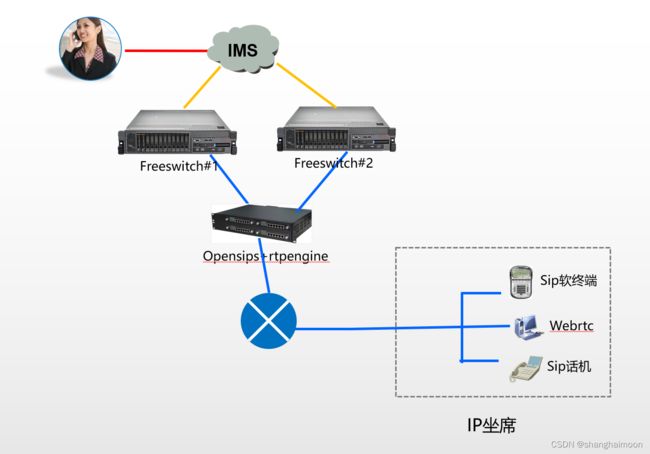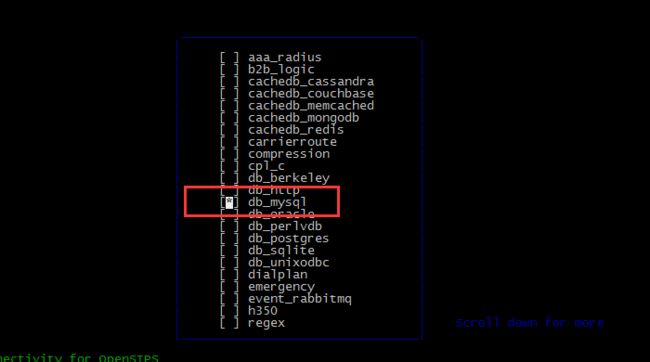基于Opensips+Rtpengine+Freeswitch实现的网络电话系统
最近公司有一个项目,需要实现一套网络电话系统,主要的需求如下:支持SIP软/硬终端,支持webrtc终端,对接运营商IMS服务,媒体服务器双机负载均衡。根据多年的工作经验,很轻松的就考虑采用Opensips+Rtpengine+Freeswitch的架构来实现,其实如果项目无需支持webrtc的话,Rtpengine也是可以省去的。闲言少续,上结构图:
对于Freeswitch的配置不作为本文的重点,本文重点介绍的是Opensips+Rtpengine的相关安装和配置。为了简化部署,这次将Opensips和Rtpengine安装在同一台服务器上,操作系统为Centos7.6。
- 源码安装配置opensips
1.从官网下载opensips,版本为2.4.11。
2.解压后执行make menuconfig(注意提前安装好mysql数据库)
在编译的过程中如果提示错误,根据错误信息去安装相应的依赖包就行。
3.配置数据库并建表
编辑 vim usr/local/etc/opensips/opensipsctlrc
执行脚本如下:
[root@os opensips]# cd /usr/local/sbin/
[root@os sbin]# ls
opensips opensipsctl opensipsdbctl opensipsunix osipsconfig osipsconsole
[root@os sbin]# ./opensipsdbctl create如果提示成功的话,安装就大功告成了!
- 源码安装rtpengine
#!/bin/bash
# Install the packages required to compile RTP engine
set -e
yum install iptables-devel kernel-devel kernel-headers xmlrpc-c-devel
yum install "kernel-devel-uname-r == $(uname -r)"
yum install glib glib-devel gcc zlib zlib-devel openssl openssl-devel pcre pcre-devel libcurl libcurl-devel xmlrpc-c xmlrpc-c-devel
yum install libevent-devel glib2-devel json-glib-devel gperf libpcap-devel git hiredis hiredis-devel redis perl-IPC-Cmd
# MariaDB ver 10+
yum install MariaDB-devel MariaDB-client MariaDB-shared
# Spandsp
yum install spandsp-devel spandsp
# epel
yum install epel-release
# libwebsockets
yum install libwebsockets libwebsockets-devel
# ffmpeg
rpm --import http://li.nux.ro/download/nux/RPM-GPG-KEY-nux.ro
rpm -Fvh http://li.nux.ro/download/nux/dextop/el7/x86_64/nux-dextop-release-0-1.el7.nux.noarch.rpm
# check for Nux desktop repo by yum repolist
yum -y install ffmpeg ffmpeg-devel
# Get The Latest Release Of RTPEngine Source From RTPEngine’s GitHub Repository
cd /usr/local/src
if [ -d rtpengine ]; then
cd rtpengine
make clean
git pull
else
git clone https://github.com/sipwise/rtpengine.git
fi
# Compile and install the daemon
cd /usr/local/src/rtpengine/daemon/
make
cp rtpengine /usr/sbin/rtpengine
# Compile and install iptables extension
cd /usr/local/src/rtpengine/iptables-extension
make all
cp libxt_RTPENGINE.so /usr/lib64/xtables/.
# Compile and install the kernel module xt_RTPENGINE
cd /usr/local/src/rtpengine/kernel-module
make
# determine kernel release
uname -a
kernel_ver=`uname -r`
cp xt_RTPENGINE.ko /lib/modules/${kernel_ver}/extra/xt_RTPENGINE.ko
depmod -a
# load module at boot time
# Add the following lines to /etc/modules-load.d/rtpengine.conf (add the following lines)
CONF_FILE=/etc/modules-load.d/rtpengine.conf
echo '# load xt_RTPENGINE module' > ${CONF_FILE}
echo 'xt_RTPENGINE' >> ${CONF_FILE}
# load the module and check
modprobe xt_RTPENGINE
lsmod | grep xt_RTPENGINE
# check files
ls -l /proc/rtpengine/control
ls -l /proc/rtpengine/list
TableID=0
# add forwarding table with an ID=$TableID. $TableID is a number between 0-63
echo 'add 0' > /proc/rtpengine/control
# Adding iptables rules to forward the incoming packets to xt_RTPENGINE module
iptables -I INPUT -p udp -j RTPENGINE --id $TableID
ip6tables -I INPUT -p udp -j RTPENGINE --id $TableID特别注意点:
系统的openssl的版本必须为1.1.1以上,否则DTLS协商会出错。
spandsp必须使用freeswitch源安装,否则编译会出错。
当以上两个软件都安装完成后,就可以通过配置opensips.cfg的脚本来实现功能了,为了避免商业纠纷,以下以简化的opensips配置来举例说明:
#
# OpenSIPS residential configuration script
# by OpenSIPS Solutions
#
# Please refer to the Core CookBook at:
# http://www.opensips.org/Resources/DocsCookbooks
# for a explanation of possible statements, functions and parameters.
#
####### Global Parameters #########
debug=3
log_stderror=no
log_facility=LOG_LOCAL0
fork=yes
children=4
auto_aliases=no
listen=udp:127.0.0.0:5060 # TODO: update with your local IP and port
listen=ws:127.0.0.0:8080 # TODO: update with your local IP and port
####### Modules Section ########
# set module path
mpath="/usr/local/lib/opensips/modules/"
#### SIGNALING module
loadmodule "signaling.so"
#### StateLess module
loadmodule "sl.so"
#### Transaction Module
loadmodule "tm.so"
modparam("tm", "fr_timeout", 5)
modparam("tm", "fr_inv_timeout", 30)
modparam("tm", "restart_fr_on_each_reply", 0)
modparam("tm", "onreply_avp_mode", 1)
#### Record Route Module
loadmodule "rr.so"
modparam("rr", "append_fromtag", 0)
#### MAX ForWarD module
loadmodule "maxfwd.so"
#### SIP MSG OPerationS module
loadmodule "sipmsgops.so"
#### FIFO Management Interface
loadmodule "mi_fifo.so"
modparam("mi_fifo", "fifo_name", "/tmp/opensips_fifo")
modparam("mi_fifo", "fifo_mode", 0666)
#### URI module
loadmodule "uri.so"
modparam("uri", "use_uri_table", 0)
#### USeR LOCation module
loadmodule "usrloc.so"
modparam("usrloc", "nat_bflag", "NAT")
modparam("usrloc", "db_mode", 0)
#### REGISTRAR module
loadmodule "registrar.so"
#### RTPengine protocol
loadmodule "rtpengine.so"
modparam("rtpengine", "rtpengine_sock", "udp:127.0.0.0:60000")
#### Nathelper protocol
loadmodule "nathelper.so"
modparam("registrar|nathelper", "received_avp", "$avp(rcv)")
#### UDP protocol
loadmodule "proto_udp.so"
#### WebSocket protocol
loadmodule "proto_ws.so"
####### Routing Logic ########
# main request routing logic
route{
if (!mf_process_maxfwd_header("10")) {
sl_send_reply("483","Too Many Hops");
exit;
}
if (has_totag()) {
# sequential requests within a dialog should
# take the path determined by record-routing
if (loose_route()) {
if (is_method("INVITE")) {
# even if in most of the cases is useless, do RR for
# re-INVITEs alos, as some buggy clients do change route set
# during the dialog.
record_route();
}
# route it out to whatever destination was set by loose_route()
# in $du (destination URI).
route(relay);
} else {
if ( is_method("ACK") ) {
if ( t_check_trans() ) {
# non loose-route, but stateful ACK; must be an ACK after
# a 487 or e.g. 404 from upstream server
t_relay();
exit;
} else {
# ACK without matching transaction ->
# ignore and discard
exit;
}
}
sl_send_reply("404","Not here");
}
exit;
}
# CANCEL processing
if (is_method("CANCEL")) {
if (t_check_trans())
t_relay();
exit;
}
t_check_trans();
if (!is_method("REGISTER")) {
if (from_uri!=myself) {
# if caller is not local, then called number must be local
if (!uri==myself) {
send_reply("403","Rely forbidden");
exit;
}
}
}
# preloaded route checking
if (loose_route()) {
xlog("L_ERR",
"Attempt to route with preloaded Route's [$fu/$tu/$ru/$ci]");
if (!is_method("ACK"))
sl_send_reply("403","Preload Route denied");
exit;
}
# record routing
if (!is_method("REGISTER|MESSAGE"))
record_route();
if (!uri==myself) {
append_hf("P-hint: outbound\r\n");
route(relay);
}
# requests for my domain
if (is_method("PUBLISH|SUBSCRIBE")) {
sl_send_reply("503", "Service Unavailable");
exit;
}
# check if the clients are using WebSockets
if (proto == WS)
setflag(SRC_WS);
# consider the client is behind NAT - always fix the contact
fix_nated_contact();
if (is_method("REGISTER")) {
# indicate that the client supports DTLS
# so we know when he is called
if (isflagset(SRC_WS))
setbflag(DST_WS);
fix_nated_register();
if (!save("location"))
sl_reply_error();
exit;
}
if ($rU==NULL) {
# request with no Username in RURI
sl_send_reply("484","Address Incomplete");
exit;
}
# do lookup with method filtering
if (!lookup("location","m")) {
t_newtran();
t_reply("404", "Not Found");
exit;
}
route(relay);
}
route[relay] {
# for INVITEs enable some additional helper routes
if (is_method("INVITE")) {
t_on_branch("handle_nat");
t_on_reply("handle_nat");
} else if (is_method("BYE|CANCEL")) {
rtpengine_delete();
}
if (!t_relay()) {
send_reply("500","Internal Error");
};
exit;
}
branch_route[handle_nat] {
if (!is_method("INVITE") || !has_body("application/sdp"))
return;
if (isflagset(SRC_WS) && isbflagset(DST_WS))
$var(rtpengine_flags) = "ICE=force-relay DTLS=passive";
else if (isflagset(SRC_WS) && !isbflagset(DST_WS))
$var(rtpengine_flags) = "RTP/AVP replace-session-connection replace-origin ICE=remove";
else if (!isflagset(SRC_WS) && isbflagset(DST_WS))
$var(rtpengine_flags) = "UDP/TLS/RTP/SAVPF ICE=force";
else if (!isflagset(SRC_WS) && !isbflagset(DST_WS))
$var(rtpengine_flags) = "RTP/AVP replace-session-connection replace-origin ICE=remove";
rtpengine_offer("$var(rtpengine_flags)");
}
onreply_route[handle_nat] {
fix_nated_contact();
if (!has_body("application/sdp"))
return;
if (isflagset(SRC_WS) && isbflagset(DST_WS))
$var(rtpengine_flags) = "ICE=force-relay DTLS=passive";
else if (isflagset(SRC_WS) && !isbflagset(DST_WS))
$var(rtpengine_flags) = "UDP/TLS/RTP/SAVPF ICE=force";
else if (!isflagset(SRC_WS) && isbflagset(DST_WS))
$var(rtpengine_flags) = "RTP/AVP replace-session-connection replace-origin ICE=remove";
else if (!isflagset(SRC_WS) && !isbflagset(DST_WS))
$var(rtpengine_flags) = "RTP/AVP replace-session-connection replace-origin ICE=remove";
rtpengine_answer("$var(rtpengine_flags)");
} 大家在测试的过程中一定要通过抓包和查看日志来分析判断问题,并且建议一定要对SIP协议(以RFC3261为主)有比较好的理解。最后,大家如有什么问题和建议,也可以给我留言沟通。




